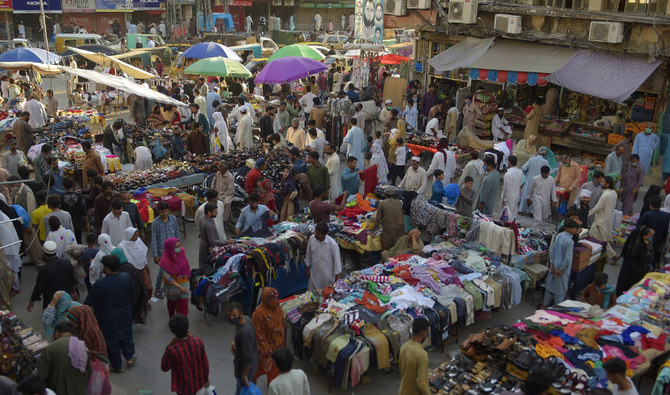KARACHI: Provincial governments and doctors warn that coronavirus infections will surge in Pakistan and overwhelm the health system, following the Supreme Court's decision to lift some of the remaining restrictions imposed on businesses to slow the outbreak.
The court ordered the government on Monday to reopen shopping malls and allow businesses to operate on weekends. It said that the virus outbreak "apparently is not a pandemic in Pakistan" and questioned why fighting it was "swallowing so much money."
With the Muslim Eid Al-Fitr holidays approaching, shops have been drawing massive crowds, which local authorities fear they will not be able to control following the court's order.
"We believe that if people continue to violate standard operating procedures (SOPs), it will aggravate the situation, lead to a surge in cases and collapse of the health system," Sindh Education and Labor Minister Saeed Ghani told Arab News on Tuesday, adding that the court has barred the authorities from sealing markets and imposing penalties on those who violate the SOPs.
"It makes the administration powerless in implementing protective measures," he said.
Liaquat Shahwani, spokesman of the Balochistan government, said that authorities in his province had already eased restrictions before the court's decision and the enforcement of virus precautions has been difficult as neither the traders nor their customers would obey.
"We fear that opening bazaars and shopping malls will increase the infection rate, which is growing each day," he said, "But we have no option, as while stemming the virus is necessary, it is also necessary that people can earn to buy food."
"We respect the decision of the apex court," he added.
Doctors, meanwhile, say they have been overburdened by the outbreak and are increasingly falling victim to the virus.
“More than 1,100 health officials have to stay at their homes after contracting the coronavirus. Health experts foresee a major surge in infections as the SOPs are not followed," Dr Qaiser Sajjad, secretary general of the Pakistan Medical Association (PMA), told Arab News.
He said that Pakistan's current infection figures are not reflective of the situation on the ground.
On Tuesday, Pakistan reported nearly 44,000 COVID-19 cases and over 939 deaths.
"We are inching 50,000 cases which is very high, but the real figures may be several times higher than that," Sajjad said, as the country of 210 million has so far tested only 400,300 people.
He added that the court's decision has shifted the responsibility to handle the outbreak from the health sector to the government and judiciary.
















